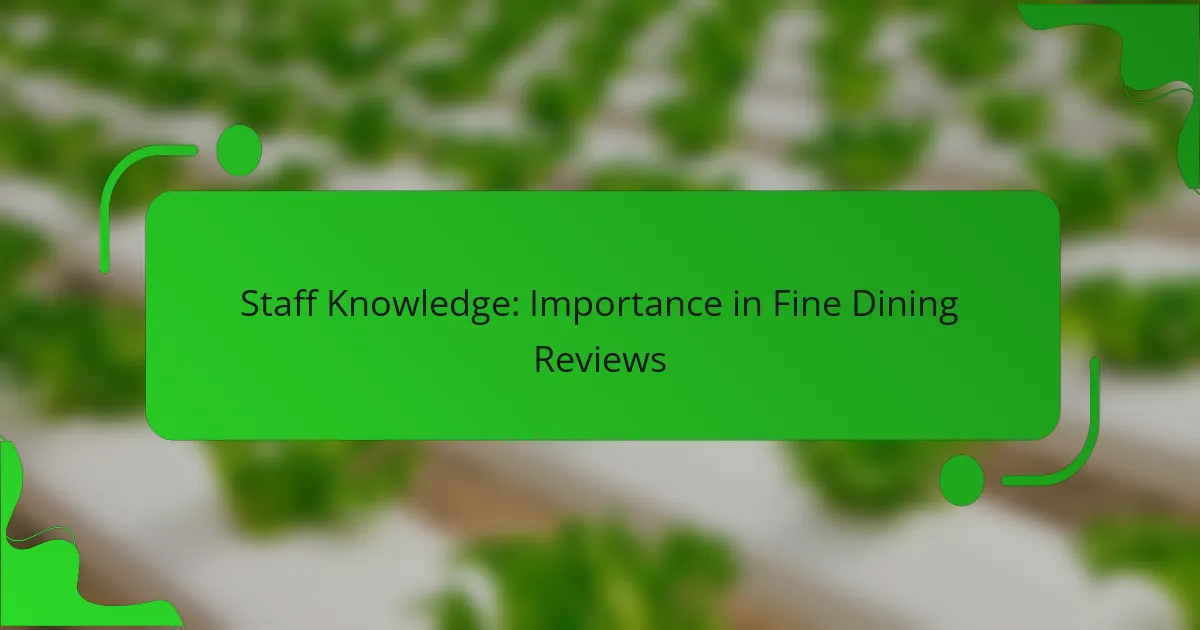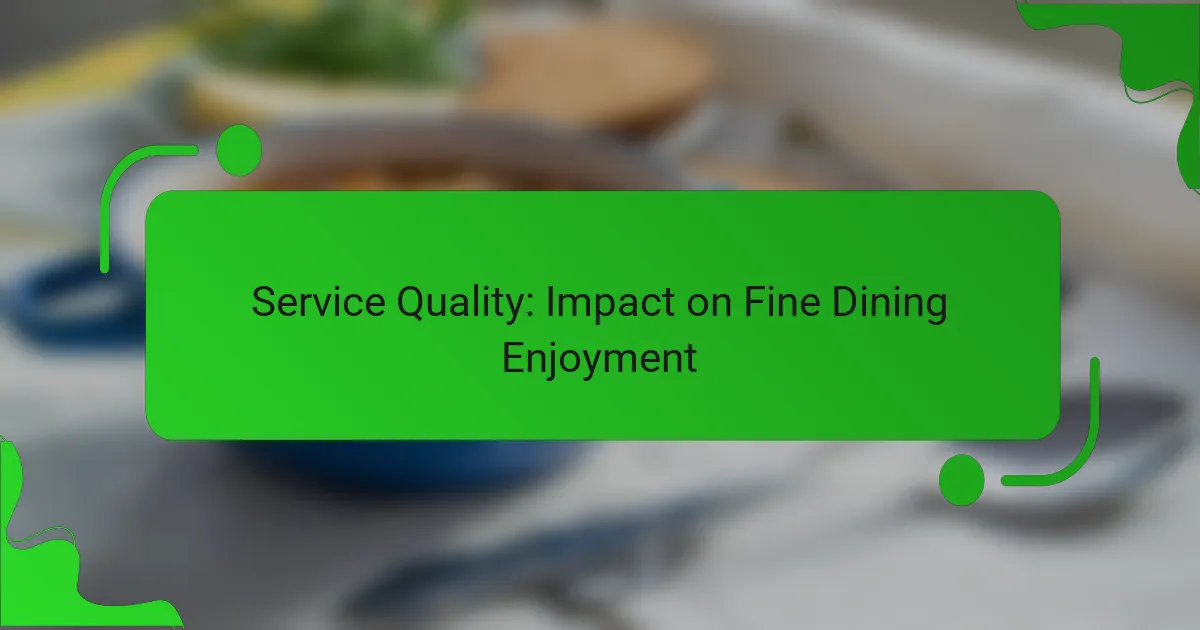In the realm of fine dining, staff knowledge plays a crucial role in shaping customer experiences and influencing reviews. A well-informed team can enhance the dining atmosphere by offering insights into the menu, wine pairings, and service etiquette, ultimately leading to more positive feedback. By investing in structured training and mentorship, restaurants can ensure their staff is equipped to meet and exceed customer expectations.

How does staff knowledge impact fine dining reviews in New York?
Staff knowledge significantly influences fine dining reviews in New York by enhancing the overall dining experience and shaping customer perceptions. Well-informed staff can provide valuable insights about the menu, wine pairings, and service, which can lead to more favorable reviews.
Enhanced customer experience
A knowledgeable staff member can elevate the dining experience by offering personalized recommendations and answering questions about the menu. For instance, if a guest is unsure about which wine to pair with their meal, an experienced server can suggest options that complement the flavors, making the meal more enjoyable.
Additionally, staff who are well-versed in the restaurant’s offerings can create a more engaging atmosphere. This interaction fosters a connection between the diner and the establishment, often leading to memorable experiences that customers are likely to share in their reviews.
Increased credibility of reviews
When staff demonstrate expertise and confidence in their knowledge, it enhances the credibility of the restaurant in the eyes of diners. Customers are more likely to trust reviews that mention attentive and informed service, as it reflects a commitment to quality and professionalism.
Moreover, positive interactions with knowledgeable staff can lead to more detailed and favorable reviews. Diners often highlight exceptional service in their feedback, which can significantly impact the restaurant’s reputation and attract new customers.
Higher ratings and repeat business
Restaurants with knowledgeable staff often receive higher ratings on review platforms due to the positive experiences they create. A well-informed team can address customer needs effectively, leading to satisfaction that translates into higher scores on sites like Yelp or TripAdvisor.
Furthermore, diners who have had exceptional service are more likely to return. Repeat business is crucial in New York’s competitive dining scene, where customer loyalty can significantly affect a restaurant’s success. Establishments that prioritize staff training and knowledge are better positioned to cultivate a loyal customer base.

What are the key areas of staff knowledge in fine dining?
Key areas of staff knowledge in fine dining include menu knowledge, wine pairing expertise, and service etiquette. Mastering these areas enhances the dining experience and ensures customer satisfaction.
Menu knowledge
Menu knowledge involves understanding each dish’s ingredients, preparation methods, and presentation. Staff should be able to describe dishes accurately and recommend options based on dietary restrictions or preferences.
For example, if a guest is vegetarian, staff should confidently suggest suitable dishes and highlight any modifications that can be made. Familiarity with seasonal changes in the menu is also crucial, as it allows staff to provide up-to-date recommendations.
Wine pairing expertise
Wine pairing expertise is essential for enhancing the dining experience through complementary flavors. Staff should know which wines pair well with specific dishes, considering factors like acidity, body, and flavor profiles.
A practical approach is to offer a few pairing options for each course, allowing guests to choose based on their taste preferences. Training staff on the basics of wine regions and varietals can also improve their ability to make informed suggestions.
Service etiquette
Service etiquette encompasses the behaviors and practices that create a refined dining atmosphere. This includes proper table settings, attentive service, and respectful communication with guests.
Staff should be trained in the nuances of fine dining etiquette, such as how to serve wine, when to refill water glasses, and how to respond to guest inquiries. Consistency in these practices fosters a professional environment and enhances the overall dining experience.

How can restaurants improve staff knowledge?
Restaurants can enhance staff knowledge through structured training, mentorship, and actively incorporating feedback from customer reviews. These strategies ensure that employees are well-informed about the menu, service standards, and customer expectations, leading to improved dining experiences.
Regular training sessions
Regular training sessions are essential for keeping staff updated on menu changes, service techniques, and industry trends. These sessions should be scheduled frequently, ideally monthly, to reinforce knowledge and skills. Incorporating hands-on practice and role-playing can make these sessions more engaging and effective.
Consider using a mix of formats, such as workshops, online courses, and guest speakers from the culinary field. This variety can cater to different learning styles and keep the training fresh and interesting for the staff.
Mentorship programs
Mentorship programs pair less experienced staff with seasoned employees, fostering a culture of learning and support. This one-on-one guidance can help new hires acclimate faster and gain confidence in their roles. Mentors can share valuable insights about the menu, customer interactions, and effective service techniques.
Setting clear goals for mentorship relationships can enhance their effectiveness. For instance, establishing a timeline for skill development or specific knowledge areas to cover can help both mentors and mentees stay focused and accountable.
Incorporating feedback from reviews
Incorporating feedback from customer reviews is crucial for improving staff knowledge and service quality. Restaurants should regularly analyze feedback to identify common themes and areas for improvement. This can include both positive comments and constructive criticism, which can guide training efforts and highlight successful practices.
Creating a system for sharing this feedback with staff, such as weekly meetings or a shared digital platform, can ensure that everyone is aware of customer perceptions. Additionally, recognizing staff members who excel based on feedback can motivate the team and reinforce the importance of attentive service.

What role does staff knowledge play in customer satisfaction?
Staff knowledge is crucial for enhancing customer satisfaction in fine dining. When staff members are well-informed about the menu, wine pairings, and service standards, they can create a more enjoyable and seamless dining experience for guests.
Personalized service
Personalized service is a key aspect of fine dining that relies heavily on staff knowledge. When servers understand the preferences and dietary restrictions of their guests, they can tailor recommendations that enhance the meal experience. For example, knowing a guest’s favorite flavor profiles allows staff to suggest dishes that will delight them.
To achieve personalized service, staff should engage in active listening and ask open-ended questions. This approach helps them gather valuable information about the guests’ tastes and expectations, leading to a customized dining experience.
Effective problem resolution
Effective problem resolution is essential in maintaining customer satisfaction, especially in fine dining settings. Knowledgeable staff can quickly address issues, such as incorrect orders or food quality concerns, ensuring that guests feel valued and heard. A well-informed team can provide immediate solutions, such as offering a replacement dish or a complimentary item.
To empower staff in resolving problems, training should focus on common issues and appropriate responses. Role-playing scenarios can help staff practice their problem-solving skills, making them more confident in handling real-life situations.
Building rapport with guests
Building rapport with guests is facilitated by staff knowledge, which fosters a welcoming atmosphere. When staff can share insights about the menu, such as the origin of ingredients or the chef’s inspiration, it creates a connection with diners. This engagement can lead to repeat visits and positive word-of-mouth recommendations.
To strengthen rapport, staff should be encouraged to share personal experiences related to the menu items. For instance, if a server has visited a vineyard featured on the wine list, sharing that story can enhance the dining experience and make guests feel more connected to the establishment.

How can fine dining establishments measure staff knowledge?
Fine dining establishments can measure staff knowledge through a combination of customer feedback surveys, performance evaluations, and knowledge assessments. These methods provide insights into how well staff understand the menu, wine pairings, and overall dining experience.
Customer feedback surveys
Customer feedback surveys are a direct way to gauge staff knowledge from the diners’ perspective. By asking specific questions about the staff’s ability to answer menu-related queries or provide recommendations, restaurants can identify strengths and areas for improvement.
Surveys can be distributed digitally or on paper, and should include questions that rate staff knowledge on a scale, alongside open-ended questions for detailed feedback. Regularly analyzing this data helps establishments adapt training programs to enhance staff expertise.
Performance evaluations
Performance evaluations offer a structured approach to assess staff knowledge during regular reviews. Managers can observe interactions between staff and guests, focusing on how well employees communicate menu details and respond to inquiries.
These evaluations should incorporate specific criteria related to knowledge, such as familiarity with ingredients, cooking techniques, and wine selections. Setting clear benchmarks allows for consistent assessments and targeted training initiatives based on evaluation outcomes.
Knowledge assessments
Knowledge assessments can take the form of quizzes or practical tests designed to evaluate staff understanding of the menu and service standards. These assessments can be conducted periodically to ensure ongoing staff development and retention of critical information.
Incorporating both written and hands-on components can provide a comprehensive view of staff knowledge. Establishments should aim for assessments that challenge employees while remaining relevant to their daily responsibilities, ensuring that staff are well-prepared to enhance the dining experience.

What are the challenges in maintaining staff knowledge?
Maintaining staff knowledge in fine dining is crucial yet challenging due to high turnover rates, the complexity of menus, and the need for continuous training. These factors can lead to inconsistencies in service quality and guest experience if not properly managed.
High turnover rates
High turnover rates in the hospitality industry can disrupt the continuity of service and knowledge retention. New staff members may require extensive training to get up to speed, which can strain resources and affect service quality. Establishing a supportive work environment and offering competitive benefits can help reduce turnover.
Complexity of menus
Fine dining menus often feature intricate dishes and extensive wine lists, making it essential for staff to have in-depth knowledge. Staff must be able to describe ingredients, preparation methods, and pairing suggestions accurately. Regular tastings and training sessions can enhance staff familiarity with the menu offerings.
Continuous training requirements
Continuous training is necessary to keep staff updated on new dishes, seasonal changes, and evolving culinary trends. This can be resource-intensive, requiring time and investment. Implementing a structured training program that includes regular updates and assessments can ensure that staff remain knowledgeable and confident in their roles.



